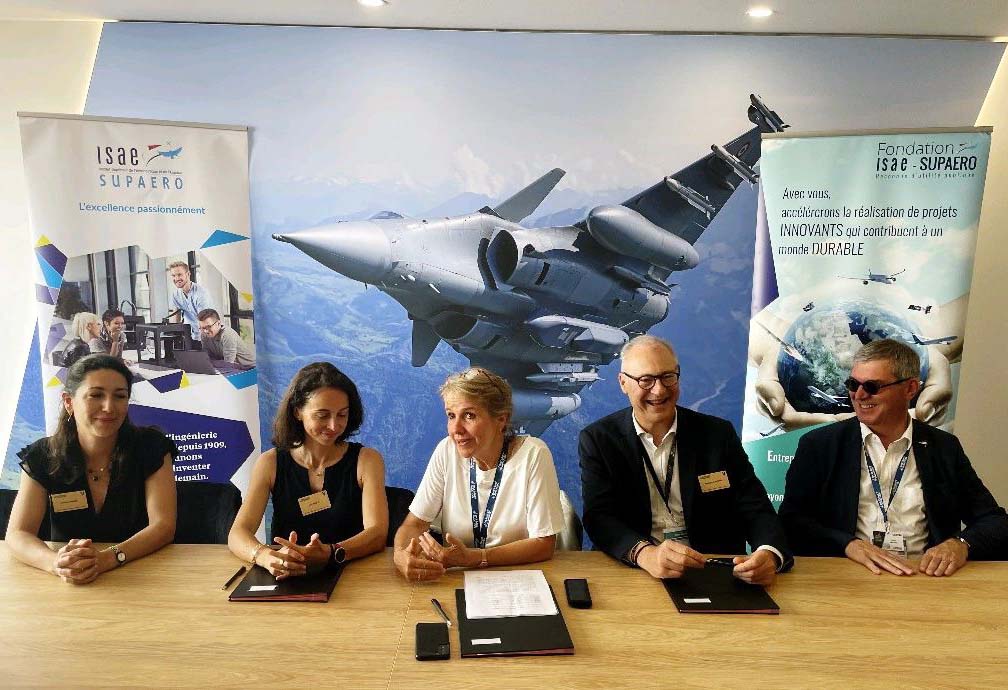< back to articles
Dassault Aviation and ISAE-SUPAERO renew CASAC Chair at Bourget 2025
Published on
Created in 2016 with the support of Dassault Aviation, the Cognitive Air Systems Design and Architecture (CASAC) chair has established itself as a global pioneer, thanks to the major advances of its first two phases, crossing neuro-ergonomics and AI and giving rise to recognized publications.
Phase 3 (2025-2030) builds on this success by focusing on the human-centered design of collaborative civil and military aeronautical systems, in preparation for future cognitive air systems integrating AI and decision support.

CASAC 1 (2016-2021): Laying the foundations
The first phase established this theme at the interface between cognitive science, engineering and aeronautics. Three axes structured this founding phase:
- Research: exploration of neuroergonomics, cognitive load and human-machine interaction, with pioneering approaches (eye-tracking, brain imaging, physiological sensors).
- Training: integration into the ISAE-SUPAERO curriculum, internships and joint projects with Dassault Aviation, expert path for students.
- International openness: hosting foreign researchers, student exchanges, recognized publications in major conferences.
CASAC 2 (2022-2024): deepening human-system coupling
This second phase marked an increase in power with four main thrusts:
- implementation of joint performance metrics,
- experimentation with non-invasive sensors (thermal cameras, EEG, eye-tracking),
- development ofdynamic adaptation algorithms,
- development of innovative assistance modules (MINERVA, HEROIC).
It also gave rise to ICCAS (International Conference on Cognitive Aircraft Systems), which has become an essential scientific and industrial event.
CASAC 3 (2025-2030): designing tomorrow’s collaborative systems
The third phase, formalized at Bourget 2025, focuses on the human-centered design of heterogeneous collaborative aeronautical systems. Under the scientific direction of Caroline Chanel, professor at ISAE-SUPAERO, research focuses on four areas:
- Robust and reliable multimodal identification of operator mental states and action intentions enhanced by brain-machine interface technologies ;
- Efficient, robust and reliable human-machine collaboration integrating the estimation of action intentions and the cognitive state of human operators, and the dynamic adaptation of artificial agent initiatives;
- Decision support tools for planning and allocating tasks between manned and unmanned vehicles;
- Assistive functions and adaptive human-machine interfaces for aircraft cockpits integrating: estimation of pilots’ degraded cognitive states, and pilots’ preferences regarding the initiative-taking of artificial agents in specific operational contexts.
Training tomorrow’s engineers
The Chair’s advances also benefit ISAE-SUPAERO’s training programs. The Chair’s work is used as teaching material in two areas of training: Autonomous Systems, and Neuroergonomics and Artificial Intelligence, both of which are offered in the third year of the engineering program. The Chair’s work also supports the research projects offered to Master’s in Aerospace Engineering students each year.
A long-term commitment
This renewal illustrates the steadfastness of Dassault Aviation and ISAE-SUPAERO in their determination toanticipate the technological and human challenges of the aeronautics of the future.
For the ISAE-SUPAERO Foundation, it’s also a demonstration of the power of corporate philanthropy over the long term: giving research and training the means to explore new horizons.
With CASAC 3, the adventure continues, true to its initial mission: to invent the cognitive air systems of tomorrow, where man and machine cooperate for safer, more efficient and forward-looking aviation.
👩🔬 Who is Caroline Chanel?
Caroline Chanel is a professor at ISAE-SUPAERO, specializing in embedded systems and automation. She has built her career at the interface between artificial intelligence, control of complex systems and human-system interaction.
His research interests include
- development of intelligent on-board systems for the aerospace industry,
- adaptive control and resilience of airborne architectures,
- collaborative human-machine interactions, where AI becomes a pilot’s teammate.
Involved in a number of European projects and industrial collaborations, it contributes to bridging the gap between academic research and concrete applications for the aviation of the future.
Since 2025, Caroline Chanel has been the scientific leader of the CASAC Chair, which she is guiding towards a new stage: the integration of AI and autonomy into airborne systems, while reinforcing the place of humans at the heart of the decision-making loop.